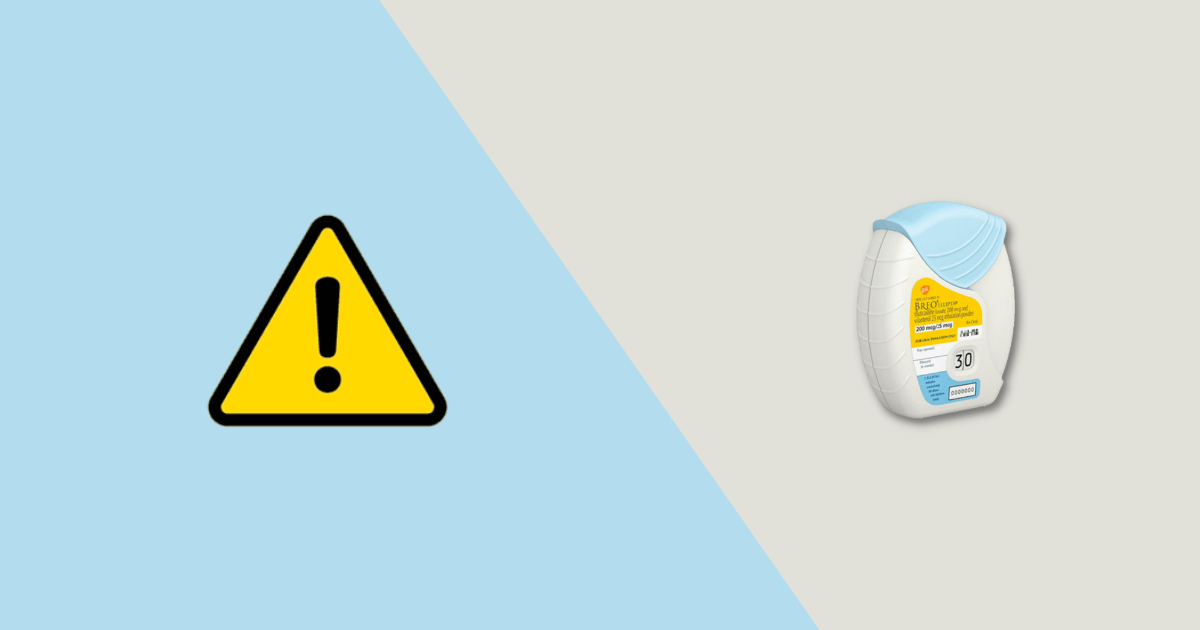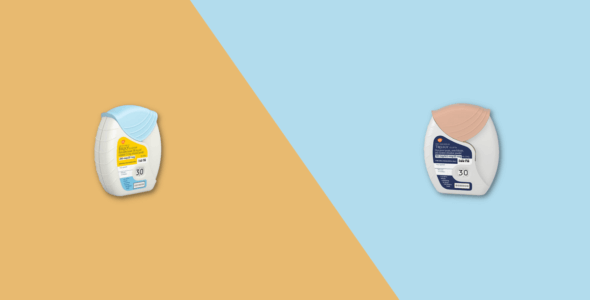Breo Ellipta side effects and how to avoid them
Table of contents
Breo Ellipta is an FDA-approved brand-name medication manufactured by GSK. Breo Ellipta contains two active ingredients, fluticasone furoate, a steroid, and vilanterol, a long-acting bronchodilator (LABA), and is used for the treatment of COPD (chronic obstructive pulmonary disease) and for the treatment of asthma. While Breo Ellipta is generally well tolerated, there are some potential side effects that people should be aware of. The most common side effects of Breo Ellipta include oral thrush and bronchitis. Less common, but more serious side effects, can include serious allergic reactions.
Learn more about the side effects of Breo Ellipta and what you can do to avoid them.
Why do people take Breo Ellipta (fluticasone/vilanterol)?
Breo Ellipta is used daily to open up your airways and make breathing easier, providing relief from the symptoms of COPD and asthma. It also helps to reduce the chances and severity of the sudden onset of severe symptoms, like asthma attacks.
Breo Ellipta is not recommended for use in people with acute bronchospasm or asthma that can be managed with ICS (inhaled corticosteroids) or inhaled short-acting beta2-agonist prescription drugs such as ProAir HFA, Proventil HFA, or Ventolin HFA that contain albuterol.
Breo Ellipta contains two active ingredients, fluticasone furoate, a steroid, and vilanterol, a long-acting bronchodilator (LABA). They work together to relieve COPD and reduce your chances of having an asthma attack. When taken regularly, Breo Ellipta can ease COPD and asthma symptoms, and reduce the number and severity of asthma attacks
What are the common side effects of Breo Ellipta?
The most common side effects of Breo Ellipta in clinical trials include:
- Upper respiratory tract infections
- Bronchitis
- Influenza
- Fever, headaches
- Sinusitis, runny nose
- A sore throat, throat pain, cough
- Oral thrush (candidiasis) infections
- Back pain, joint pain
- Tiredness or muscle weakness
- Increased risk for high blood pressure, altered heart rate, or irregular heartbeat
More serious side effects of Breo Ellipta include:
- Severe life-threatening allergic reactions – hives, trouble breathing, swelling of your face, lips, tongue, and throat
- Hypokalemia (low potassium level)
- Osteoporosis
- Pneumonia – fever, shortness of breath, cough or chest pain
- High blood sugar – symptoms include frequent urination, increased thirst, overeating, poor wound healing, weight loss, infections
- Sudden worsening of breathing problems (paradoxical bronchospasm)
These aren’t all the side effects Breo Ellipta can cause. You can find more details in the patient leaflet that comes with your medication. If you have any concerns about side effects, talk to a healthcare professional.
Breo Ellipta dosage
Breo Ellipta is available as a Breo comes as a dry powder inhaler. The inhaler contains 2 foil blister strips of the powder formulation that is used for oral inhalation. One of the strips contains fluticasone furoate 100 or 200 mcg per blister and the other strip contains vilanterol 25 mcg per blister.
For the maintenance treatment of COPD use 1 inhalation of Breo Ellipta 100/25 once daily. For asthma use, 1 inhalation of Breo Ellipta 100/25 or 200/25 once daily. Breo Ellipta is a once-daily medication used to treat various respiratory issues, such as chronic bronchitis and emphysema. Breo is not a rescue inhaler and should not be used in cases of a sudden breathing problem. If you forget to take a dose, skip the missed dose and take your next dose at the usual time. Do not double your doses.
Is it safe to take Breo Ellipta and other medications?
Breo Ellipta can interact with other medications. These include:
- Other medicines that contain a LABA (beta2-adrenergic agonist) – formoterol, salmeterol
- Beta-blockers
- Diuretics
- Certain antifungals such as itraconazol, ketoconazole, and voriconazole
- Monoamine oxidase inhibitors
- Tricyclic antidepressants
- CYP3A4 inhibitors such as clarithromycin, ritonavir, and grapefruit
Breo Ellipta can cause drug interactions with other medications. This can change how Breo Ellipta and other medications work and can make side effects more likely. Tell your prescribing physician about all your drugs, including vitamins and dietary supplements.
Breo Ellipta warnings & precautions
You should not use Breo Ellipta if you:
- Are allergic to the active ingredients fluticasone furoate or vilanterol
- Are allergic to any of the other ingredients in Breo Ellipta
- Have a severe allergy to milk proteins
- Are under 18 years of age
Talk to your doctor before starting to use Breo Ellipta if you:
- Have any heart problems
- Have any immune system problems
- Have high blood pressure
- Have a current viral, bacterial, fungal, or parasitic infection
- Have been exposed to measles or chickenpox
- Suffer from seizures
- Have any thyroid problems
- Have diabetes or high blood sugar
- Have any liver problems
- Have osteoporosis
- Have any eye problems, like glaucoma, cataracts, or an increase in pressure in your eyes
- Are pregnant or are planning to get pregnant
- Are breastfeeding or are planning to breastfeed – there is no knowledge of fluticasone furoate/vilanterol passes into breast milk
Please read the prescribing information and drug information provided with your medication and always speak with your healthcare professional for medical advice about any changes to your dose so they can monitor and evaluate your condition.
Does Breo Ellipta cause weight gain?
Breo Ellipta may cause weight gain due to high cortisol levels caused by Breo Ellipta. If you are concerned about weight gain with Breo Ellipta talk to your doctor.
Does Breo Ellipta cause withdrawal symptoms?
Stopping treatment with Breo Ellipta may cause your symptoms to become worse. Speak to your healthcare professional first if you are considering stopping treatment with Breo Ellipta.
How long can you stay on Breo Ellipta?
You should continue to use Breo Ellipta unless your healthcare professional tells you otherwise. Breo Ellipta will continue to work as long as you continue to use it. Your doctor will choose an alternative medicine for you if needed.
Does Breo have a steroid in it?
Breo Ellipta contains fluticasone and vilanterol. Fluticasone is a steroid and vilanterol is a bronchodilator.
What does Breo Ellipta do to your lungs?
Breo Ellipta reduces swelling in your lungs helping you to breathe more easily. Vilanterol helps to relax muscles around your airways helping to open them up and allowing you to breathe easier.
Does Breo cause a decrease in bone mineral density?
Using steroid inhalers does increase the risk of osteoporosis and increases the risk of broken bones.
What is the difference between the side effects of Breo Ellipta and the side effects of other inhalers?
The side effects experienced when using an inhaler will vary depending on the active ingredients of the inhaler you are using. Speak to your healthcare professional to discuss your options, and to learn more about the potential side effects before you start using any inhalers.
How to avoid Breo Ellipta side effects
The best way to avoid side effects is to take Breo Ellipta as directed by your doctor. Follow your doctor’s instructions carefully and do not use more or less than prescribed.
If you experience any side effects, talk to your doctor or pharmacist. They may be able to recommend ways to help reduce or prevent some of the side effects.
1. Stick to the recommended dosage
Take your prescribed dose of Breo Ellipta that has been recommended by your healthcare professional. Do not take more or less than prescribed.
2. Monitor your blood sugar levels
If you have diabetes, it is important to monitor your blood sugar levels closely while taking Breo Ellipta. Check your blood sugar levels as directed by your doctor and report any changes to your doctor immediately.
3. Drink plenty of fluids
Drink eight to 10 glasses of water or fluids every day to help prevent dehydration, which can make side effects worse.
4. Avoid alcohol
Alcohol does not directly affect using a Breo Ellipta. However, alcohol may worsen the symptoms of asthma or COPD. Speak to your healthcare provider for medical advice around alcohol consumption when using Breo Ellipta.
5. Don’t skip meals
Eating regular meals and snacks will help to prevent low blood sugar levels (hypoglycemia).
6. Check your feet
If you have diabetes, check your feet for any cuts, sores, or redness regularly. Tell your doctor if you experience any problems with your feet while taking Breo Ellipta.
7. Know the signs and symptoms of Breo Ellipta side effects
Signs and symptoms of side effects include oral thrush and upper respiratory tract infections. If you experience any of these symptoms speak to your doctor.
8. Monitor your weight
Breo Ellipta may cause weight loss or weight gain, depending on whether Breo Ellipta increases or decreases your cortisol levels (Breo Ellipta can do both). If you experience changes in your weight while taking Breo Ellipta, get medical advice from your doctor.
9. Tell your doctor about all medications you’re taking
Be sure to tell your doctor about all other medications you’re taking, including over-the-counter drugs, vitamins, and herbal supplements, as they can interact with Breo Ellipta.
10. Get regular medical check ups
It is important to get regular medical check ups and monitor your medical conditions. Your doctor will monitor your side effects and may adjust your dose of Breo Ellipta as needed.
Medically reviewed
A medical professional has reviewed this article.


Jamie Winn, PharmD
Jamie Winn, PharmD
Dr. Jamie Winn received his Doctor of Pharmacy in 2002 from the University of South Carolina College of Pharmacy, Columbia, SC. Jamie is a medical reviewer for NiceRx.




